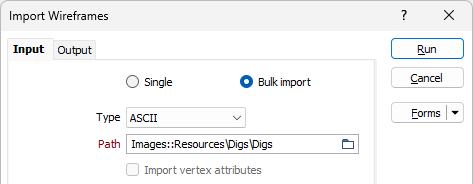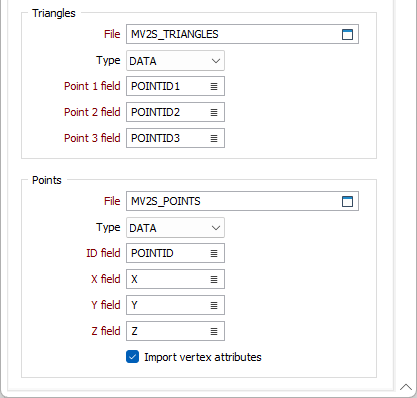Wireframes
![]()
In addition to importing wireframe data, this function has other uses. For example, you might want to reposition a wireframe by moving it 500m to the East, or apply a grid transformation to the points in a wireframe. In such cases you can Wireframes , process the exported file, and then convert it back to a wireframe using File | Import Wireframes.
Single / Bulk import
If you select the Single radio button, you can specify a file type and then use the File field to select the file to be imported.
If the Bulk Import radio button is selected, you can select a folder from the Path field to find all corresponding files of that type in the folder to be imported.

Input File Type
Choose the type of Input file from the drop-down list provided:
| File Format | Description |
|---|---|
| DWG, DXF, DXB | Import triangles represented by the 3DFACE command in an AutoCAD file. |
| VULCAN | Maptek's Vulcan (.00t ) triangulation file. Compressed file formats (Version 8 and later) and earlier file formats are supported. Files with missing auxiliary schema are also supported, from version 25.0. |
| ASCII | Requires a space separated text file in 3 parts - a header line with the number of points and number of triangles; the coordinates of the points; and the triangles, defined by the point numbers of their vertices. |
| DATAMINE BINARY | A binary triangulation file and a corresponding points file (*tr.dm) (*pt.dm) in the same location. |
| DATAMINE TEXT | A text-based triangulation export file and a corresponding points file (*tr.*) (*pt.*) in the same location. These files will usually have ( .txt ) file extension. |
| SURPAC1 |
Gemcom ( .dtm ). Surpac DTM files contain three-dimensional images. |
| MICROMINE | The function is expecting two files. The first, a triangles file, must contain records with identifiers for the three points in each triangle. The second, a points file, contains the X, Y and Z coordinates for each point. In each case you must define the names of the fields in those files. |
| PLY | Stanford Polygon Library ( .ply ) |
| RAW | Raw triangles ( .raw ) |
| OMF | Open Mining Format ( .omf ) |
| OBJ | Wavefront Object ( .obj ) |
| DAE | Collada Collada ( .dae ) |
| BLEND | Blender ( .blend ) |
| 3DS | 3D Studio Max ( .3ds ) |
| ASE | 3D Studio Max ASE ( .ase ) |
| FBX | Autodesk ( .fbx ) |
| STL | Stereolithography ( .stl ) |
| GOCAD TSURF | GOCAD wireframe (.ts) |
1 Support for trisolations in Surpac DTM files is provided. If you are not importing as a single wireframe, a prefix and a numeric ID are used to uniquely name each trisolation.
If you select the Import vertex attributes option, per-vertext wireframe attributes will be included in the Surpac import.
File name
Double-click or use the Browse button to navigate to the location of the file containing the triangulated data you want to import.
Triangles and Points files
If you selected Micromine as the input file type, enter the type and name of the Micromine file that contains the wireframe Triangle definitions. Each record represents a triangle by listing the Point Ids (as defined in the Points file) for the three vertices.
Import vertex attributes
If you selected Micromine as the input file type, select this check box to import per-vertex attributes. Per-vertex wireframe attributes may be calculated by other functions, such as Wireframe | Calculations | Compare, or be manually calculated and imported.
